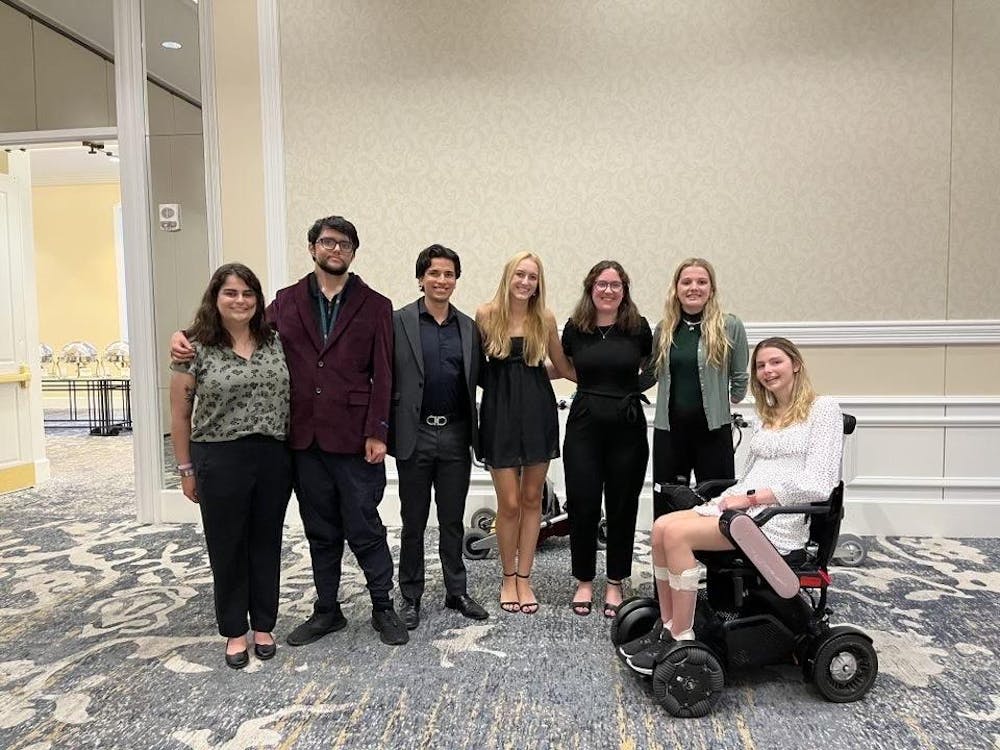Notre Dame’s AccessABLE club works to advocate for inclusion, as well as provide a campus community for students with disabilities and their allies, the club’s student leaders said.
Co-president and senior Jill Maudlin said she was encouraged to check out AccessABLE after reaching out to student recipients of the Matthew Swinton Endowment for Excellence in Service to the Disabled to ask about accessibility at Notre Dame upon her acceptance. While Maudlin did not end up being a participant in the program, which supports students who need accommodations at admitted students’ days, she highlighted the impact of having student mentors and has helped out with the program throughout her time as a student.
Junior Meghan Ellis, vice president of AccessABLE, joined because she was looking for a community on campus with others navigating similar experiences.
“I’m so lucky because we’re a small group but we have such a strong presence,” she said.
Senior and co-president Scott Patterson echoed this statement.
“I saw how in my own life knowing other people with disabilities was super helpful because they could help me navigate some of the academic and social pressures that come with being with disabled,” he said. He added that this sense of community was what prompted him to become a leader in the club.
AccessABLE’s meetings are often either dedicated to community building through games and activities or to advocacy work, Patterson shared.
Ellis described AccessABLE’s “cookies and complaints” meetings as some of her favorites, during which club members eat cookies and discuss both positive and negative experiences on campus.
“It’s a great way to help people feel like they’re not alone in their experiences,” she said.
One issue Ellis highlighted was how it can take a while for Notre Dame to respond when an accessibility feature of a building stops working, something both Ellis and Patterson noted.
“If there’s only one accessible entrance to such an important building on campus, it's frustrating to know that these kinds of things don’t get prioritized like they should,” Ellis said, citing a time when the only accessible door button for entry into LaFortune Student Center took five days to fix. She added that both these buttons and elevators frequently stop working.
Ellis also shared that students with mobility scooters for temporary injuries often park them in front of accessible door buttons, adding that she has “over 100 photos” of instances where this has happened.
The club officer team tries to communicate these concerns to people in Sara Bea Accessibility Services, which assists Notre Dame students with accommodations and other needs, or other parts of the University, something Patterson said has had a real impact, leading them to streamline the process for reporting and fixing concerns. Sara Bea Accessibility Services did not respond to a request for comment.
Like all students in need of accommodations, Patterson shared he met with different consultants at Sara Bea Accessibility Services to go over his housing and academic needs.
In general, Patterson said professors have been understanding and accommodating. He also noted the inclusive attitude of the Notre Dame student body, saying, "one of the things I was very surprised about at Notre Dame was how willing to help the students are.”
In addition to accommodations, Sara Bea Accessibility Services partners with students on a number of advocacy projects, something Maudlin has worked to expand after noticing upon her arrival that Notre Dame was lacking in “any sort of advocacy or social justice work” for students with disabilities.
Maudlin noted the importance of the Accessibility Leadership Fellows program, housed in Sara Bea Accessibility Services, which she worked with to advocate for a ride service to assist students who use mobility devices in the winter months.
She also touched on Sara Bea Accessibility Service’s efforts to develop student leaders, describing her participation serving as a mentor in their mentorship program, as well as opportunities for students like herself to assist with policy work, programming and communications. Maudlin acknowledged some limitations, however.
“Sara Bea does not have the manpower or the funding to do everything that they’re asked to do,” Maudlin said.
Ellis said she would like to see more of is spaces designed with more than just physical disabilities in mind.
“Notre Dame has come a long way in creating more accessible spaces in terms of physical disabilities, but I think we still have a long way towards thinking about accessibility for all disabled people … you can't just have wheelchair accessible bathroom stalls and door buttons and think that you've created an entirely accessible space,” Ellis said.
Ellis added it can be difficult for people to understand the wide variety of disabilities enough to proactively design spaces with them in mind. She believes the work that AccessABLE and the Accessibility Fellows Program does helps to raise this necessary awareness.
Student government also plays a role in advocating for accessibility at Notre Dame, after Maudlin pushed for the addition of the department of disability advocacy. Since the department’s creation, Maudlin explained, students have worked to incorporate closed captions in the stadium, make Notre Dame’s social media presence more accessible, introduce virtual menus in grab and go, add an American Sign Language interpreter at large events such as welcome weekend, create an educational poster campaign and compile a residence hall accessibility report.










